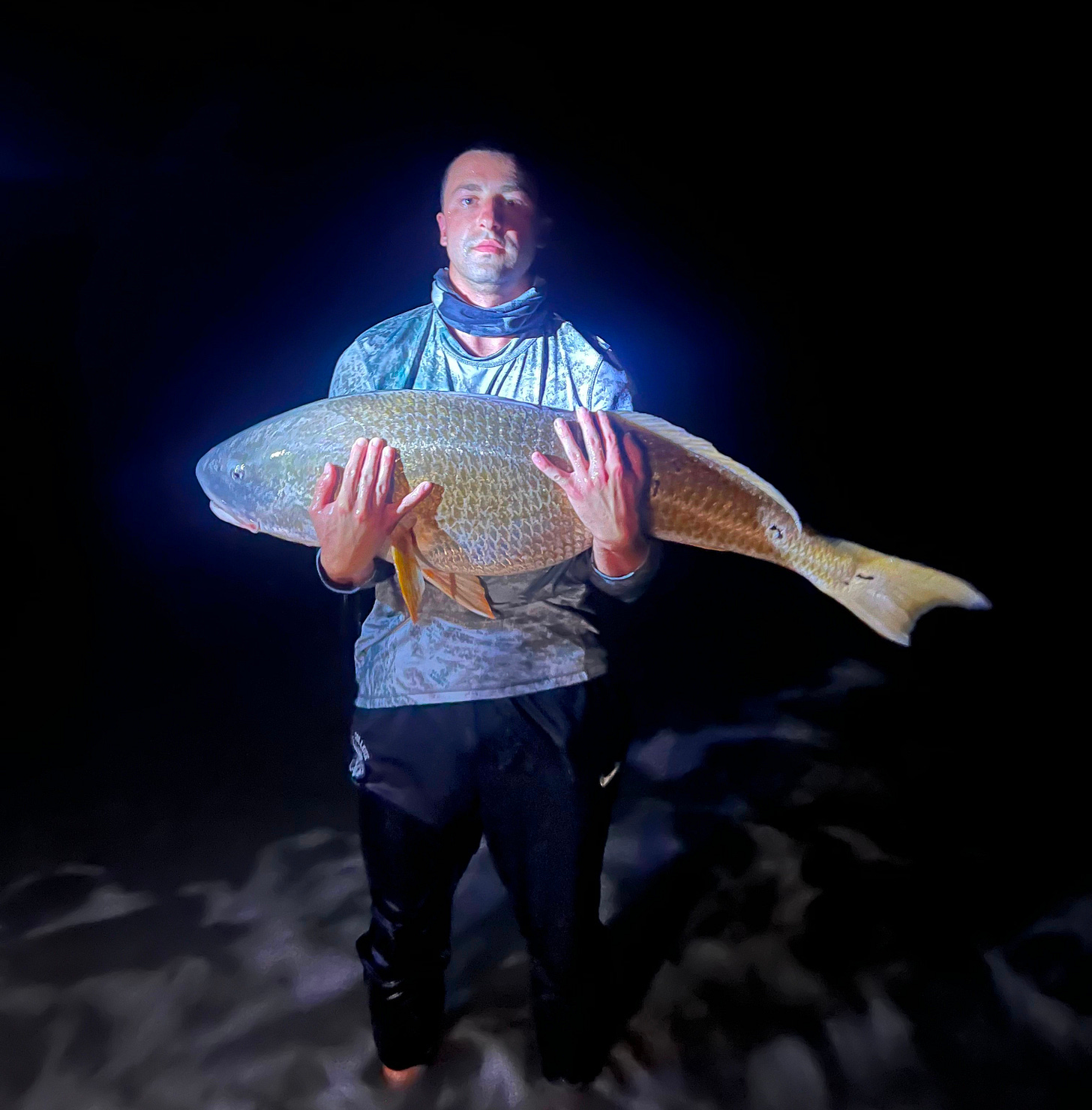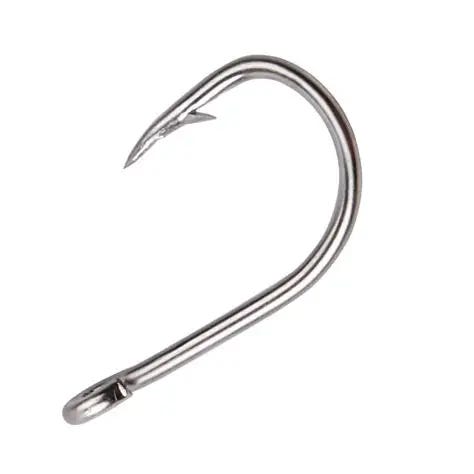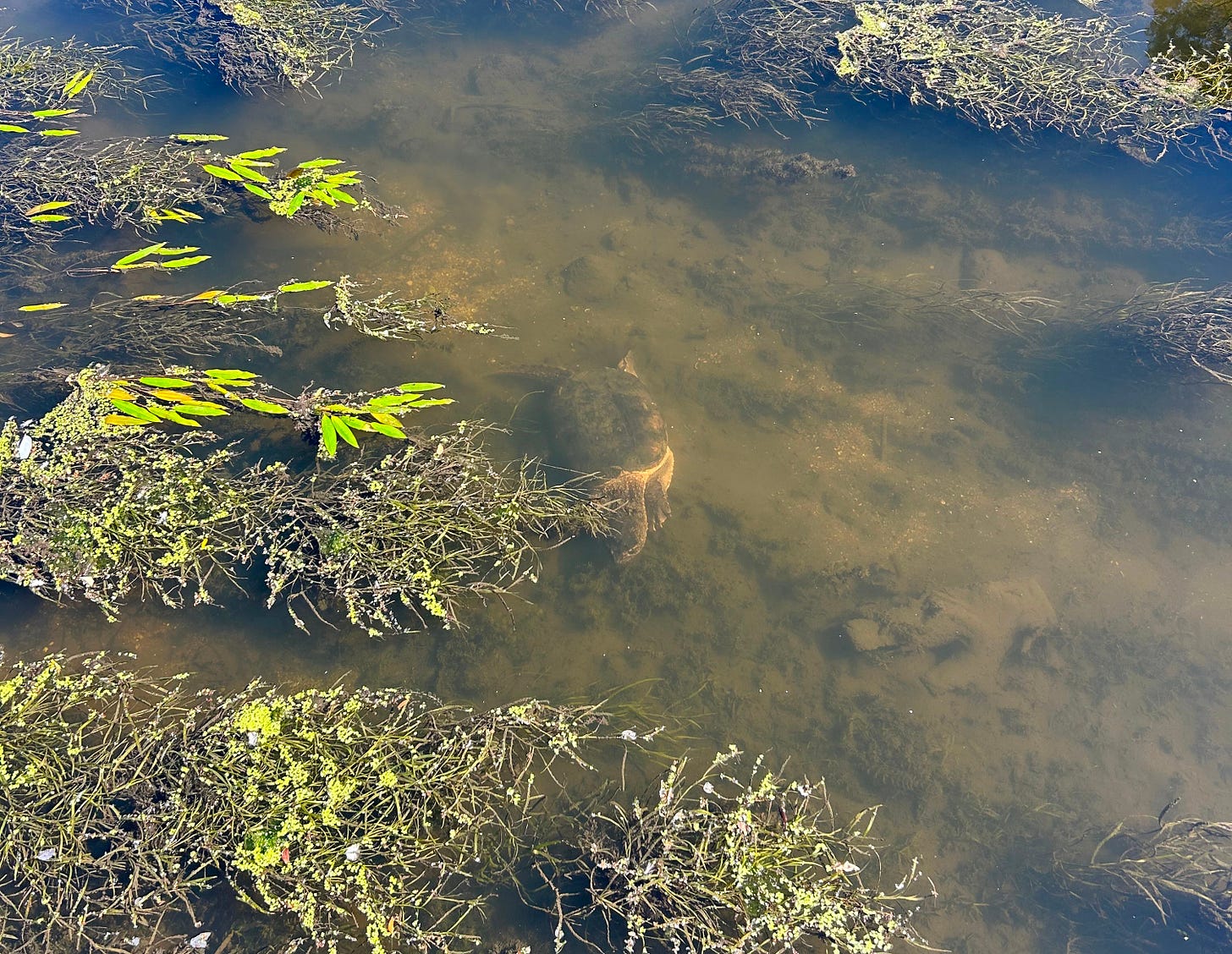Repaying my redfish debt
I caught a hog the other night. Biggest redfish I’ve ever seen.
Granted, I didn’t grow up around here, so I haven’t seen too many reds. But if you ask anyone who’s seen a lot of ‘em, they’ll tell you this thing is a hog.
I haven’t spent all that much time fishing in recent years, so this monster, which we thought was a shark until it came ashore, was a nice surprise.
Now, I am a fisherman—there’s no doubt about that. Fishing was, along with books and soccer, my childhood passion. But I stopped going out to the ponds as much when I left adolescence.
Partly because life got busy. But also because I felt bad about it.
You see, though fishing is a blast—more exhilarating to me than nightlife and festivals combined—it just doesn’t feel right. At least, that is, fishing for sport.
It wasn’t so much of a problem when I was a kid. But as I got older, becoming more aware of myself and of life, I could no longer so easily justify my aquatic adventures. Because fishing, I came to see, can be a rather knarly thing.
Of course, it’s pretty obvious that the fish don’t love, as they’re biting into what they think is a delicious and nutritious snack, feeling a sharp piece of metal pierce the side of their face.
What’s not entirely obvious, though, is that a hook through the side of their face is about as good and clean as it gets; the fish are lucky, in other words, if they get away with but a hole in their mouth.
In my experience, especially when people who don’t know how to fish are involved, getting caught often means a life-changing, potentially life-threatening injury. Eyeballs, tongues, gills, throats, etc. The hooks don’t discriminate. And most people nowadays buy barbed hooks—and do not de-barb them (because they were never taught to, because the fishing tradition, for how commercialized it’s become, is not held sacred—I’ll explain more shortly).
For those who don’t know, barbed hooks have one or multiple “barbs” jutting out that lock the fish onto the hook so as to ensure it doesn’t get away. Which is fine and dandy if you’re planning to kill and eat the fish, but pretty horrible if you’re fishing for sport. Because when you try and remove the hook from the fish’s mouth, you wreak havoc on whatever tissue is in the hook’s path out.
(I’d say anyone who respected nature and was fishing for sport—meaning that they are just fishing to have fun, to enjoy the fight of this animal desperate to keep its life—would, at the very least, debarb the hook.)
Now, if that were the extent of the damage inflicted by today’s fishing industry, I wouldn’t be too, too concerned. But there’s more.
Tons of fishing equipment, which is often toxic (lead weights, soft plastic baits, etc.), gets caught in the waterways. And what people most often do, if they can’t get unstuck, is simply cut it, leaving to nature the line, the hook, and whatever was on it.
Then there are those things that aren’t meant to be caught. Turtles, ducks, aquatic mammals, so on and so forth. (The same goes for all that gets unintentionally caught up in deep-sea drag nets, which are even more destructive for their scale, not to mention all the habitat they bulldoze.) They get snagged. They bite the hook. Etc. I can’t tell you how many monster turtles I’ve hauled out of neighborhood ponds.
And then there’s the issue of culture.
The fishing industry is utterly careless. Of course, I’m not talking about everyone, especially those diehard fishermen (though not all of them, either). I’m talking about the masses. Because to most, fishing is not a way of life, but a quick weekend activity, a way to have some fun.
What’s the problem with this?
The problem is that not only do many of the companies that design and sell this fishing equipment care about the environment only as much as they’re forced to by governmental standards, but their customers—these masses who’ve been granted easy access to what’s supposed to be earned knowledge and success—are, for the most part, oblivious.
You see, most people who go fishing nowadays do not care if they snip their line and leave it sitting there in the grass next to the pond. They do not care if they open a package of bait and leave a bit of litter behind. They do not care what happens to the world around them in their wake. They take, but they do not give.
Why?
For many reasons, the central and primary, however, being an imbalance, a lack of symbiosis, an ambiguous and consequently parasitical relationship.
I’ll explain.
What’s supposed to be, as I said, an intimate, earned endeavor (think of how native people might have introduced their youth to fishing, especially with all the real-life consequences it once had if a fisherman made a mistake that led to an injury) has been commercialized, almost to the degree of amusement parks. Nature, God’s creation, has in turn become—instead of something with which to have a relationship—something to simply be used (again, as I said) for fun.
One, or perhaps the central reason for this, is that most American waterways are filthy. Partly, yes, as a result of all the garbage that makes its way into them. But also as a result of runoff. Lawns, streets, all the crap we eat and flush down the toilet. Etc.
The problem with this is that it means we cannot safely eat the fish from these waterways. And the problem with this is that it means we cannot have a practical, mutual (symbiotic) relationship with nature. Meaning that we do not care what happens to it, and that we will ultimately use it, like children use toys, to fulfill our whimsical desires, without thought of consequence in mind.
So, because of the way our society has evolved, mostly in the name of commercialization, people nowadays altogether lack a relationship with nature, because most people rely on companies and governing bodies for sustenance rather than the natural, God-given world (because most people do not live in environments where it is “safe” to harvest nature’s literal and metaphorical fruits).
If people had more of a relationship with nature, if they relied on it for not just spiritual sustenance (which is about as intimate as even the most naturey people get with it these days), but for their actual way of life, then not only would they understand it more and love it more, but they’d respect it more.
Sport fishing, I predict, would cease to be an industry. In fact, the mere existence of sport fishing demonstrates a society clearly out of whack (I’m not saying I haven’t participated). And I’d go so far as to say a whole lot of other problems, many related to physical and mental health, would resolve themselves.
What it would take for all this to happen, I’m not yet entirely sure (clean waterways would be a good start), though it is a project, an idea I’ve had in mind for a while.
As noted recently, I want to start writing more about nature.
It seems here that I’ve carved out some sort of mission for myself, something both deeply relevant personally and something I believe would make the world a better place . . .
I turned away from fishing because I believed this thing I loved would fare better without me. But it appears I have, for one reason or another, been called to return.
*pause for dramatic effect*
The reason I write all this today is because I am upset. With myself.
When I caught that redfish the other night, it swallowed the hook. And I did not have a swallowed hook remover with me. So I had to snip the line and send it back with the hook still in (or else risk suffocation).
(We would have eaten it, but it was far too big to be legal—she, and I say she because it was a very girthy red, was about 42-45 inches, and somewhere between 40 and 50+ pounds.)
This fish, especially for someone from the Midwest like myself, was a once-in-a-lifetime catch. I reckon it would have broken and/or competed for the record redfish in multiple Atlantic and Gulf states.
Having an encounter with such an animal, which could have been older than me, is nothing short of mystical. Both elevating and grounding. Having to return it to the depths with that piece of metal still in its mouth was honestly heartbreaking. Because it’s likely going to die. While I managed to resuscitate her after a couple of minutes, the hook, unless it somehow dislodges, is bound to disrupt the fish’s ability and willingness to feed.
I recently learned that redfish spawning season has just begun, and will last until sometime in October (which explains why this fish was in the inlet). This is good news, because it means she may live long enough to reproduce at least once more.
Nevertheless, I now feel indebted, bound to return the favor, the blessing bestowed upon me that night.
I’m not exactly sure how to do this, other than by referring as many readers as possible to the Coastal Conservation League, a local conservation organization here in South Carolina.
Obviously, people don’t love donating to random causes to which they have little or no relation, so if the CCL isn’t your cup of tea, do me a solid instead:
Wherever you are, get out into nature. Make an effort to cultivate a relationship with your environment. Become aware of what’s going on in your town and in your community. Are the forests littered with garbage? Are the waterways clean? Have you tried growing a garden?
(Good Lord, I sound like a hippie.)
I think you get the point, so I’ll leave it at that. More to come.
Thanks for reading. If you enjoyed this post, please share it with your best friend. Or anyone.
Until next time,
RB





Well done, Ryan. I understand why you feel bad. As exciting as it was at that moment, it doesn't feel fair to the fish. Hopefully, it will live on for a long time. Remember bobber butt? It probably worked itself out at some point, and maybe it will this time, too.